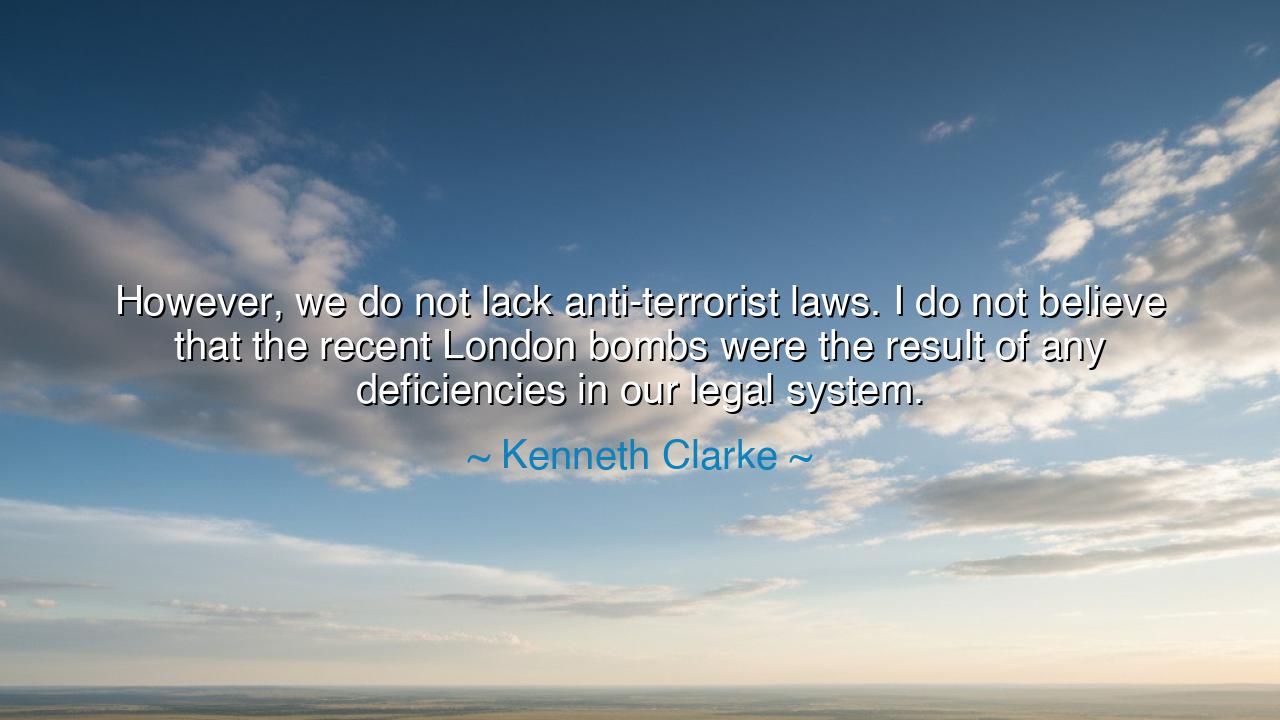
However, we do not lack anti-terrorist laws. I do not believe
However, we do not lack anti-terrorist laws. I do not believe that the recent London bombs were the result of any deficiencies in our legal system.






When Kenneth Clarke declared, “However, we do not lack anti-terrorist laws. I do not believe that the recent London bombs were the result of any deficiencies in our legal system,” his words carried the calm wisdom of one who sees beyond panic, beyond vengeance, into the deeper heart of governance. Spoken in the aftermath of the London bombings of 2005, his statement rose against the storm of fear that gripped a wounded nation. In those hours, many cried for stronger laws, harsher punishments, and greater surveillance. But Clarke, a veteran of both law and politics, reminded the people that the strength of a nation lies not in the endless forging of new chains, but in the steadfast preservation of justice and reason.
The origin of his words lies in a moment of great sorrow and confusion. London had been struck by terror — an assault not only on its people, but on its ideals. In the wake of blood and fire, the instinct of the crowd was to demand action — to believe that perhaps the law itself had failed, that its weakness had invited destruction. But Clarke, ever the moderate voice in times of extremity, refused this illusion. He knew that no number of anti-terrorist laws could stop those who have already forsaken life and reason. To him, the true battle was not to multiply statutes, but to defend the moral foundation of liberty from the corrosion of fear.
Throughout the ages, men have faced the same trial. In times of danger, they have been tempted to sacrifice freedom for security, justice for control. The Roman Republic, in its final days, granted its leaders emergency powers to face crisis after crisis — and in doing so, it sowed the seeds of empire. The people gained protection, but they lost their voice. Clarke’s warning echoes this ancient lesson: that laws written in haste, under the shadow of fear, often serve not to protect the people, but to chain them. He spoke as one who understood that the rule of law must not bend to every gust of terror, lest it lose its sacred strength.
His words also reveal a deeper truth — that terrorism is not born from the absence of law, but from the failure of humanity itself. The bombers of London were not the product of legal deficiency, but of moral disconnection, of alienation and hatred festering in the shadows of society. Clarke’s statement, therefore, was not an act of denial, but of clarity. He saw that no new decree could heal the wound of the human heart; that to fight terror, one must rebuild trust, community, and faith in shared values. The legal system, he insisted, was not the problem — and to mutilate it in fear would be to grant victory to the very evil it sought to oppose.
Consider the example of Winston Churchill, who during the Blitz refused to suspend the laws of Parliament, even as bombs rained upon London. “We shall not let the war make us unworthy of victory,” he said. He knew that in the darkest moments, the measure of civilization is not how fiercely it fights, but how faithfully it holds to its principles. Clarke’s message stands in the same lineage: that to abandon fairness, due process, and liberty in the name of safety is to betray the very civilization we claim to defend.
Yet his words were not meant to comfort the complacent. They were a call to wisdom — to recognize that law is not a weapon of impulse, but a pillar of endurance. To strengthen a nation, one must enforce its laws with consistency, not emotion; with judgment, not hysteria. For as the ancients taught, “The city that fears its own laws fears its own soul.” Clarke’s calm defiance against the tides of reaction was thus an act of courage, born not of coldness, but of understanding that justice must never be driven by rage.
And so, let the lesson of Clarke’s words be remembered by every generation that faces danger: do not seek salvation in new chains. When fear whispers that freedom is weakness, answer with steadfastness. When tragedy demands vengeance, answer with justice. For the strength of a nation is not found in the length of its laws, but in the depth of its principles.
Let the people, therefore, guard their legal systems as the ancients guarded the flame of the temple — not to protect the structure, but to preserve the light. For when law remains steady amidst chaos, it becomes more than parchment; it becomes the spirit of civilization itself — unbroken, undaunted, and eternal.






AAdministratorAdministrator
Welcome, honored guests. Please leave a comment, we will respond soon